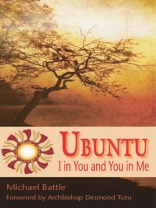For Christians, practicing Ubuntu means entering deeply into the compassionate, forgiving love of Gospel.
As defined by Archbishop Desmond Tutu, a person with Ubuntu is open and available to others, affirming of others, does not feel threatened that others are able and good, for he or she has a proper self-assurance that comes from knowing that he or she belongs in a greater whole and is diminished when others are humiliated or diminished, when others are tortured or oppressed.
The African spiritual principle of Ubuntu offers believers a new and radical way of reading the Gospel and understanding the heart of the Christian faith, and this new book explores the meaning and utility of Ubuntu as applied to Western philosophies, faith, and lifestyles.
Ubuntu is an African way of seeing self-identity formed -through community. This is a difficult worldview for many Western people, who understand self as over, against, or in competition with others. In the Western viewpoint, Ubuntu becomes something to avoid—a kind of co-dependency. As a Christian leader who understands the need, intricacies, and delicate workings of global interdependency, Battle offers here both a refreshing worldview and a new perspective of self-identity for people across cultures, and of all faiths.
Sobre o autor
Michael Battle is the Extraordinary Professor at the Desmond Tutu Centre for Religion and Social Justice, the University of the Western Cape, South Africa, and formerly taught at General Theological Seminary in New York where he was the Herbert Thompson Professor of Church and Society and Director of the Desmond Tutu Center. He was ordained a priest by Archbishop Desmond Tutu and later given one of the highest Anglican Church distinctions as “Six Preacher, ” by the Archbishop of Canterbury, Rowan Williams. Battle has published nine books, including Reconciliation: the Ubuntu Theology of Desmond Tutu, and Ubuntu: I in You and You in Me. He lives in Knightdale, North Carolina.







![Capa do Brian Schrag & Julisa Rowe: Community Arts for God's Purposes [Chinese] 貼近神心意的社群藝術 Capa do Brian Schrag & Julisa Rowe: Community Arts for God's Purposes [Chinese] 貼近神心意的社群藝術](https://static.worldofdigitals.com/thumb_webp/740/9781645083740.webp)




